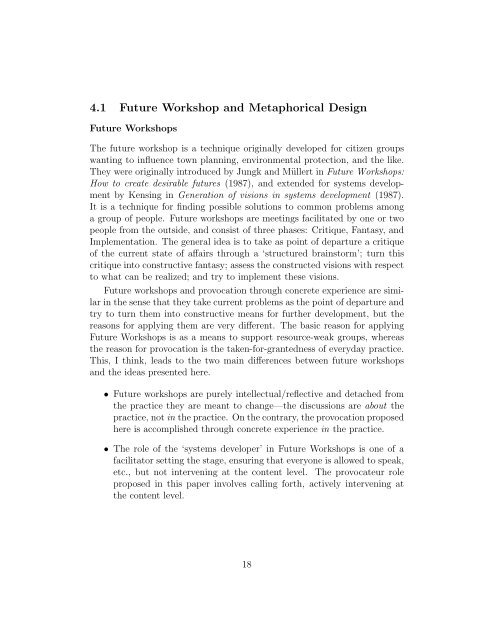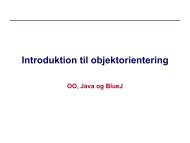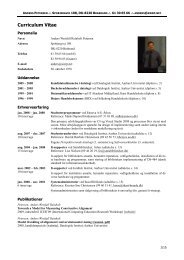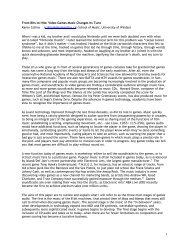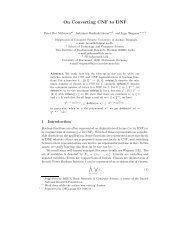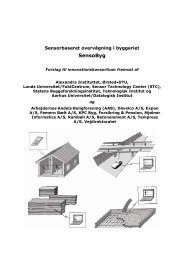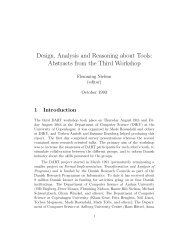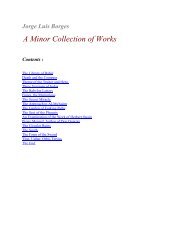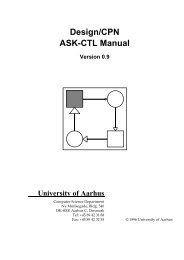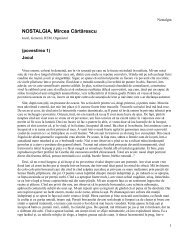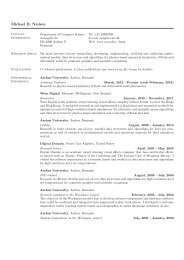towards a provotyping approach in systems development
towards a provotyping approach in systems development
towards a provotyping approach in systems development
You also want an ePaper? Increase the reach of your titles
YUMPU automatically turns print PDFs into web optimized ePapers that Google loves.
4.1 Future Workshop and Metaphorical Design<br />
Future Workshops<br />
The future workshop is a technique orig<strong>in</strong>ally developed for citizen groups<br />
want<strong>in</strong>g to <strong>in</strong>fluence town plann<strong>in</strong>g, environmental protection, and the like.<br />
They were orig<strong>in</strong>ally <strong>in</strong>troduced by Jungk and Müllert <strong>in</strong> Future Workshops:<br />
How to create desirable futures (1987), and extended for <strong>systems</strong> <strong>development</strong><br />
by Kens<strong>in</strong>g <strong>in</strong> Generation of visions <strong>in</strong> <strong>systems</strong> <strong>development</strong> (1987).<br />
It is a technique for f<strong>in</strong>d<strong>in</strong>g possible solutions to common problems among<br />
a group of people. Future workshops are meet<strong>in</strong>gs facilitated by one or two<br />
people from the outside, and consist of three phases: Critique, Fantasy, and<br />
Implementation. The general idea is to take as po<strong>in</strong>t of departure a critique<br />
of the current state of affairs through a ‘structured bra<strong>in</strong>storm’; turn this<br />
critique <strong>in</strong>to constructive fantasy; assess the constructed visions with respect<br />
to what can be realized; and try to implement these visions.<br />
Future workshops and provocation through concrete experience are similar<br />
<strong>in</strong> the sense that they take current problems as the po<strong>in</strong>t of departure and<br />
try to turn them <strong>in</strong>to constructive means for further <strong>development</strong>, but the<br />
reasons for apply<strong>in</strong>g them are very different. The basic reason for apply<strong>in</strong>g<br />
Future Workshops is as a means to support resource-weak groups, whereas<br />
the reason for provocation is the taken-for-grantedness of everyday practice.<br />
This, I th<strong>in</strong>k, leads to the two ma<strong>in</strong> differences between future workshops<br />
and the ideas presented here.<br />
• Future workshops are purely <strong>in</strong>tellectual/reflective and detached from<br />
the practice they are meant to change—the discussions are about the<br />
practice, not <strong>in</strong> the practice. On the contrary, the provocation proposed<br />
here is accomplished through concrete experience <strong>in</strong> the practice.<br />
• The role of the ‘<strong>systems</strong> developer’ <strong>in</strong> Future Workshops is one of a<br />
facilitator sett<strong>in</strong>g the stage, ensur<strong>in</strong>g that everyone is allowed to speak,<br />
etc., but not <strong>in</strong>terven<strong>in</strong>g at the content level. The provocateur role<br />
proposed <strong>in</strong> this paper <strong>in</strong>volves call<strong>in</strong>g forth, actively <strong>in</strong>terven<strong>in</strong>g at<br />
the content level.<br />
18


